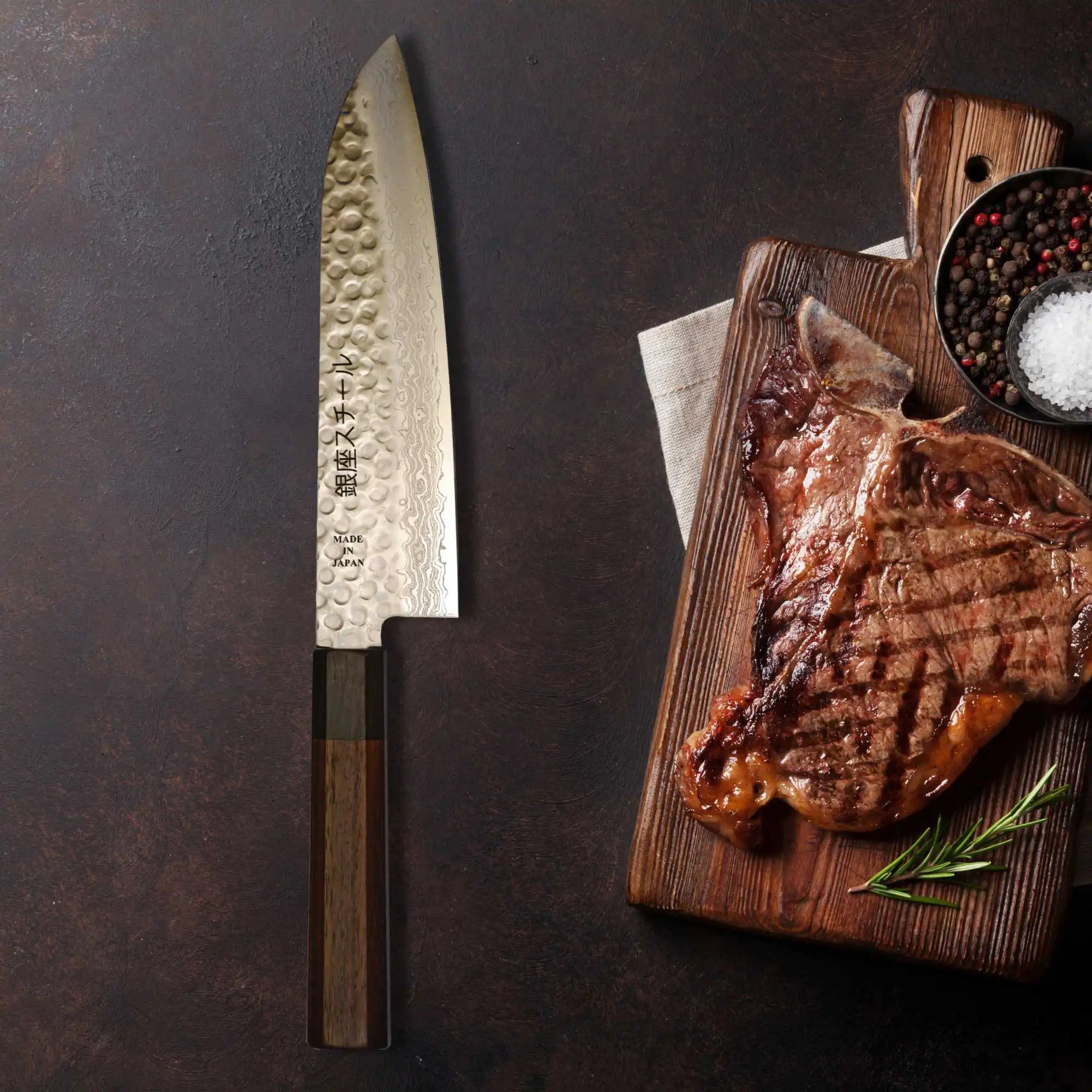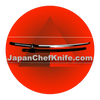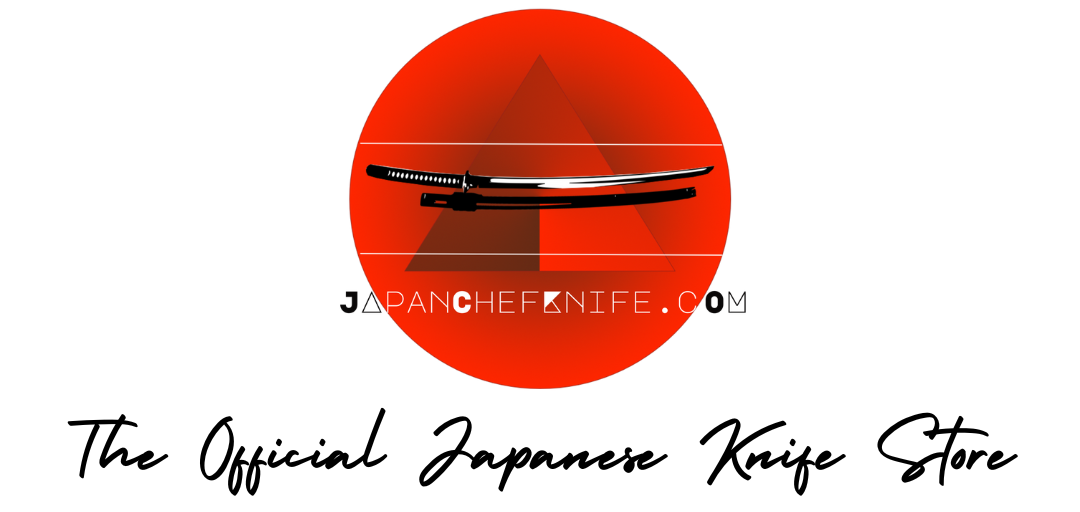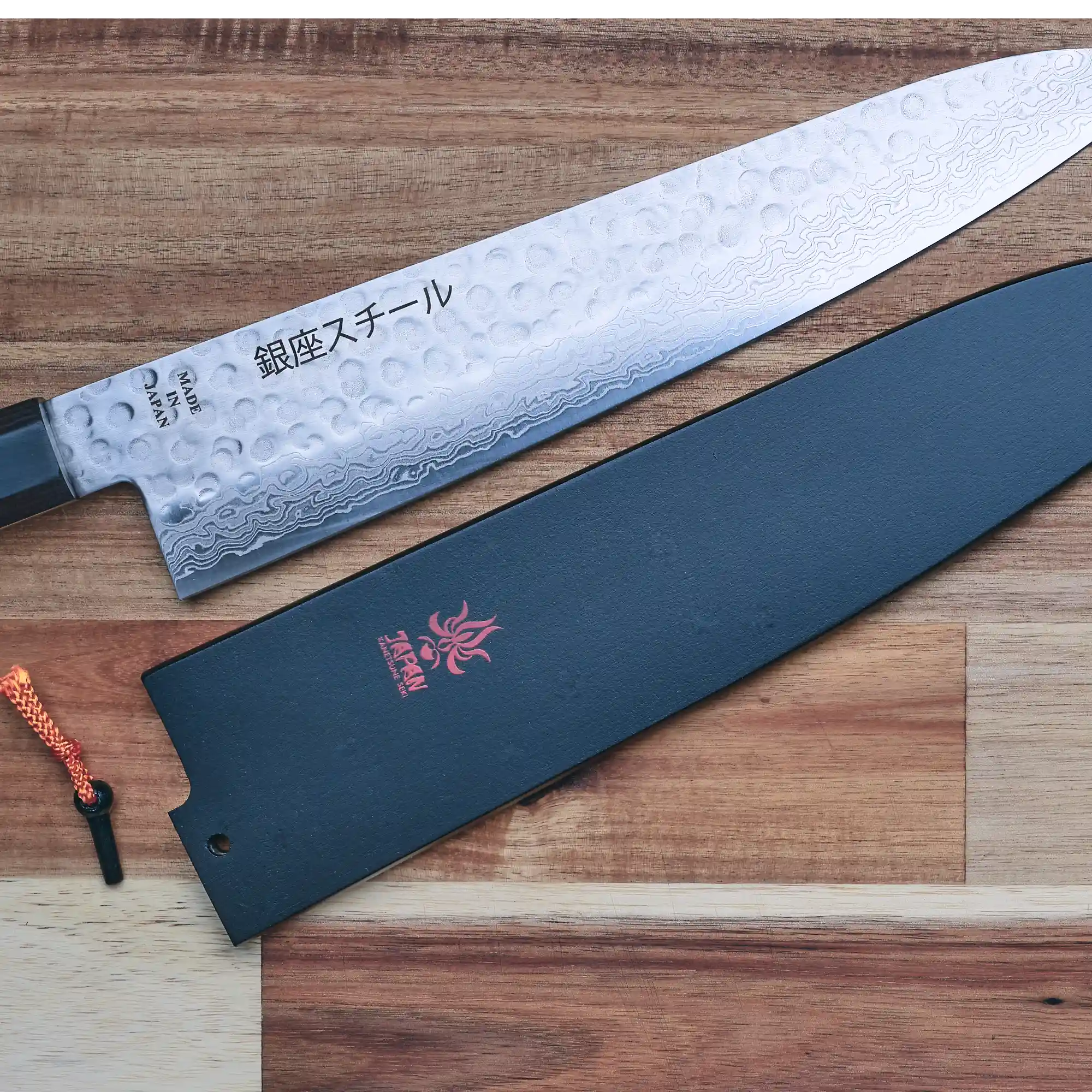
Top 10 Santoku Knives – Best Japanese Chef Knives
Top 10 Santoku Knives – Best Japanese Chef Knives
Among the Japanese knife styles, Santoku is the one that has picked up a mass following in the West. Even the cutlery brands we're all familiar with, like Henckels and WUSTHOF, all have a Santoku in their product lineup – often with hollow edges.
While these Santoku knives are typically superior to a $10 blade from a grocery store, there are better options that can add even more value to your kitchen. Although top-quality options cost more, there's a proper Santoku for every budget.
In this guide, we'll walk you through a list of top 10 Santoku knives, including budget options for home cooks, as well as insightful tips to help you find the perfect Santoku for your cutting needs.
What Is a Santoku Knife?
Santoku is one of the three all-purpose Japanese kitchen knives, along with Gyuto and Kiritsuke. This type of Japanese knife has a medium-length blade between 5 and 7 inches. Santoku's design is characterized by its sheepsfoot blade, where the spine (the dull part) meets down to the straight cutting edge. It lacks a pointy tip, unlike a typical chef's knife, but it's sharp enough to work through ingredients.
The name of this Japanese knife type literally translates to three uses (or virtues), hinting at its superior ability to slice, dice, and mince. Santoku is a versatile kitchen knife you can use for daily tasks, though the straight edge profile may take some time getting used to. For example, you can't rock chop ingredients with its straight edge as you could with a Western chef's knife but utilize other cutting techniques to quickly prepare ingredients for tasty dishes.
10 Best Santoku Knives
Below, you'll find various Santoku knives across different price ranges, cutting purposes, and priorities. You can review every Santoku further by checking their individual product pages to learn more about them to make a well-informed decision.
1) Takayama 180.

Takayama 180 is 100% hand-forged in Japan and carries the round hammering marks (tsuchime) that help prevent food from sticking to the blade while adding to its overall beauty. This knife is the true definition of a Santoku and has a Swedish 19C27 high carbon stainless steel blade.
Although not Japanese-made, there's a reason to use this steel. It gives us a lightweight Santoku that won't strain your wrist following long uses. If you're chopping and slicing all day in a fast-paced restaurant, you'll find this Santoku to be an exceptional assistant. With its elegant wa-handle (the traditional Japanese handle) and lightweight design, this Santoku is perfect for prepping ingredients in large batches.
| PROS | CONS |
|
|
- Shop on Amazon
- Shop on JapanChefKnife.com
2) Hayami 180
Hayami 180 is more for cooks who prefer a Santoku resembling their chef's knife. It won't feel awkward in your hand with its antibacterial handle made from laminated reinforced wood, similar in design to a typical chef's knife. The handle connects the blade with a semi-bolster to add confidence to your cuts.
 The blade of Hayami 180 Santoku uses 33-layer Damascus steel made from the world-renowned Japanese VG-10 steel. Beauty aside, the Damascus steel blade is incredibly sharp and stays that way for extended periods with a 59-60 HRC blade. The pattern-welding technique that goes into making this Damascus steel also results in a highly durable knife. Even if you chop and slice all day, Hayami 180 is a knife you can count on.
The blade of Hayami 180 Santoku uses 33-layer Damascus steel made from the world-renowned Japanese VG-10 steel. Beauty aside, the Damascus steel blade is incredibly sharp and stays that way for extended periods with a 59-60 HRC blade. The pattern-welding technique that goes into making this Damascus steel also results in a highly durable knife. Even if you chop and slice all day, Hayami 180 is a knife you can count on.
| PROS | CONS |
|
|
- Shop on Amazon
- Shop on JapanChefKnife.com
3) GÜDE SOLINGEN, GERMANY

GÜDE Santoku has a German touch to the Japanese Santoku with a 7-inch Santoku made in Solingen, the knife capital of Germany. Made from a special chrome, vanadium, molybdenum knife steel, GÜDE employs advanced knife making techniques to bring this Santoku to life. It's an ideal choice for chefs intimidated by the Japanese wa-handle. This Santoku comes with a familiar, riveted handle that won't feel any different in your hand.
The steel GÜDE used in this Santoku is milder than what you'll find in most Japanese kitchen knives. However, it's just as sharp – with the added benefit of being extra durable. The carefully constructed bolster and GÜDE's century-old expertise take this a step further, giving you a high-quality, extremely robust knife - a sturdy knife than a sharp one, perfect for cooks working with denser ingredients.
| PROS | CONS |
|
● Hand wash only ● A bit expensive |
4) Hagakure 20

Hagakure 20 strikes as an excellent value budget option. It has everything you'd want in a premium Japanese knife – a VG-10 steel blade, a durable (and elegant) handle, and Damascus steel construction. The best part is all these come for under $100 – excellent value cooks looking to get the most out of their investment.
Considering its price range, Hagakure 20 is a great option for culinary arts students and home cooks looking for something proper but affordable. You can confidently take it out for everyday use, whether to chop scallions to garnish dishes or butcher a whole chicken for family gatherings. Plus, its handle is dishwasher-safe, making it a very convenient knife.
| PROS | CONS |
|
|
5) Kanetsune 860 series

Kanetsune 860 series attracts those who appreciate the beauty of Japanese knives with its plain design. This Santoku knife is more for professionals looking for the absolute best. It's carefully hand-forged by a Seki artisan in Japan and only top-quality materials go into the making of this knife.
Kanetsune 860 series boasts an extremely sharp cutting edge with its VG-10 construction and measures 60 HRC hard. It has a polished, luxurious wooden wa-handle. The knife has a forward balance – an invisible hand that aids in cutting. With its lightweight nature, Kanetsune 860 is perfect for slicing and chopping endlessly in long shifts.
| PROS | CONS |
|
|
6) Kasumi 180

Kasumi 180 offers a good balance between a Western-style chef's knife and the Japanese Santoku. The 7-inch blade carries all the characteristics of a Santoku knife, but the spine meets the edge gradually rather than at a steep angle. Unlike the typical Santoku, it isn't as rectangular as other Santoku knives and may appear the same as a typical chef's knife to the untrained eye.
| PROS | CONS |
|
|
7) Matsue 165

Matsue 165 complements its ergonomic wooden handle with a razor-sharp blade that won't let you down. It stays sharp for prolonged periods, and you'll rarely need to use a whetstone – just a few strokes on a honing rod; you're good to go!
| PROS | CONS |
|
|
8) Grohmann Santoku Knife
Grohhman's Santoku is the perfect adaptation of Santoku in the Western part of the world. It has a familiar handle with hollow indent points around the edge to prevent slices from sticking to the blade. Naturally, it doesn't resemble the Japanese image of a Santoku but is just as practical and sharp as any other.Like all Grohmann Knives products, this 7-inch Santoku is made in Nova Scotia. It has a stainless steel blade with a rosewood handle. The knife feels firm with the bolster's weight and centers the balance. It's a Canadian-made Santoku that's a great budget option to the more expensive alternatives we've covered.
| PROS | CONS |
|
|
9) Kanetsune KC-950

Kanetsune KC-950 is the last budget pick on our list. It features the traditional Japanese knife appearance with hammering marks and an oval wa-handle. The blade is made from DSR1K6 steel, a Japanese knife steel with excellent toughness and corrosion resistance. The handle uses laminated wood with a plastic bolster to add durability.
It's a versatile Santoku that can be an introduction to Japanese knives. The blade measures 6.5 inches, which is optimal for home cooks who don't use the entire length of their chef's knives. It's a great knife to get a taste of Japanese kitchen knives and is capable of cutting everything you prepare on a daily basis.
| PROS | CONS |
|
|
10) Okuma 195

Okuma 195 isn't a typical Santoku – it's what we call a Kiritsuke-style Santoku. This type of Japanese knife is different from the standard Santoku with its pointed tip but is much smaller than a Kiritsuke at 7.5 inches. This particular knife, Okuma 195, has an AUS-10 steel blade with a laminated reinforced wood handle. It's incredibly sharp yet robust enough to take some beating.
This knife is perfect for those who like the blade profile of Santoku but are missing a pointed tip to pierce through ingredients. The design of the Okuma 195 is especially handy if you're butchering whole poultry or carving and deboning meat cuts regularly. The tip is also ideal for making incisions and detailed cutting. As with most other knives on our list, Okuma 195 is also handmade in Japan.
| PROS | CONS |
|
|
How to Choose the Best Santoku Knife?
When determining the ideal Santoku knife for your cutting needs, you'll need to consider a few things. Here's a quick rundown of what to think before purchasing a Santoku.
- Budget: A good-quality Santoku can cost anywhere from $75 to several hundred. We've listed some of the best Santoku knives across different price ranges so everyone can find a proper Santoku knife for their budget.
- Blade Length: Santoku knives have a blade length between 6 and 8 inches. However, even an inch can make a significant difference, depending on what you're cutting - bigger ingredients typically call for a matching blade and vice versa.
- Profession: If you're a professional chef or studying culinary arts, you'll want to consider the knife's sharpness and capability to retain it above all else. Look for blades with higher Rockwell hardness rating and wear resistance to find the right one.
- Personal Preferences: Lastly, factor in what you'd want to see in your knife. Do you fancy Damascus steel? What kind of handle do you want? Is the weight important? All these will lead you to find the best Santoku for your cutting needs.
By considering the above, you can make an informed decision when adding a brand-new Santoku to your knife collection.
Buy Santoku Knives From The Official Japanese Knife Store
We've compiled and guided you through various Santoku knives. As one of the top North American high-end knife stores, we believe in our expertise and your knife skills!

You can order any of the knives we've mentioned in the article through our website at a discounted price or place an order from our Amazon store. Stay sharp!
Keywords :
Best Japanese Santoku Knives, Top-rated Santoku Knives Japan, Premium Santoku Knife Brands, Japanese Santoku Knife Reviews, Santoku Knife Comparison, High-Quality Santoku Knife Sets, Traditional Japanese Santoku Blades, Professional Santoku Knife Selection, Japanese Santoku Knife Recommendations, Santoku Knife Buying Guide



















Leave a comment
This site is protected by hCaptcha and the hCaptcha Privacy Policy and Terms of Service apply.